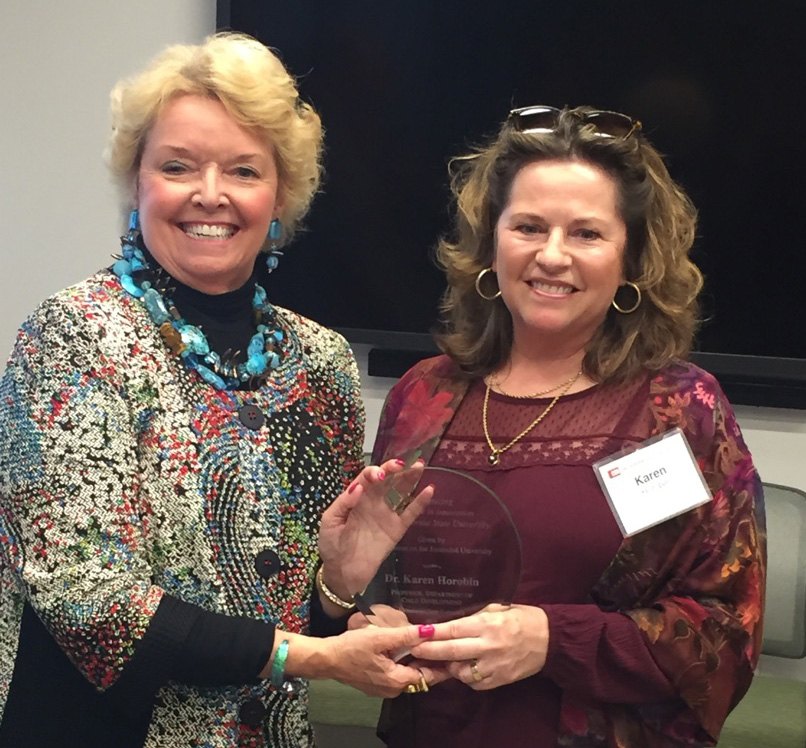 Professor Karen Horobin, right, with CSU San Marcos President Karen S. Haynes, chair of the CSU Commission on the Extended University, at the awards ceremony in Oakland. (Sacramento State/Jill Matsueda)
Professor Karen Horobin, right, with CSU San Marcos President Karen S. Haynes, chair of the CSU Commission on the Extended University, at the awards ceremony in Oakland. (Sacramento State/Jill Matsueda)Professor Karen Horobin, who teaches child development at Sacramento State, will sometimes share a story with her students about a wayward teen from Britain. The girl grew up in a working-class family where no one finished high school, and she dropped out at 15.
Yet she considered herself lucky because she found mentors.
After a string of odd jobs, she decided to start her education all over at 26. She enrolled in a British technical college, went on to a university, studied in the United States and eventually earned a doctorate in developmental psychology. She had professors who encouraged her, said she was intelligent and could choose a different life. The wayward teen was Karen Horobin.
Honoring excellence and innovation
Horobin, an educator and researcher for 30 years, earned one of the highest honors from the California State University's Office of the Chancellor and the CSU Commission on the Extended University. She is the 2016 recipient of the Edward M. McAleer Jr. Excellence & Innovation Award, which honors exceptional and innovative work in continuing education.
At the awards ceremony in Oakland on April 28, the commission surprised Horobin. The McAleer award typically includes $1,000, but members of the awards committee were so impressed with her, they doubled the amount.
Horobin, in partnership with the College of Continuing Education (CCE) at Sacramento State, developed the CSU’s first bachelor of arts degree completion program in child development, which enhanced the profession for working adults and filled a workforce need. But beyond those accomplishments, she created a new approach in mentoring.
She joined the faculty at the College of Education in 1994 “with the very specific sense to do something community-oriented,” on top of teaching a full load of classes and running a research program on early childhood learning. She volunteered at the Sacramento Employment and Training Agency's (SETA) Head Start program and spent her evenings giving academic advice to preschool teachers.
Elevating child development into a profession
With employment regulations growing more stringent, preschool teachers wishing to stick with Head Start had to finish their bachelor’s degree. But Horobin saw obstacles in their way and realized another educational path was needed. “They required much more than just classes that fit their work schedules and economic constraints,” she says. “They also needed on-site support and mentoring to help them succeed.”
Horobin took the lead in creating a hybrid program, coordinated by CCE. It combined video- streamed lectures by College of Education faculty, classes closer to the students’ worksites and built-in mentoring. A specially trained instructor, working closely with faculty, conducted discussions off-campus and mentored the same cohort of students through the entire program.
The Bachelor of Arts in Child Development: Early Development, Care and Education degree completion program launched in 2007. “This program changed the landscape of the early childhood education field forever,” says SETA Deputy Director Denise Lee. “Working professionals who would notoriously shy away from formal education found themselves eager to join, excited to learn, and elated by their own success.”
Aileen Lord had been working in the child development field for almost 20 years when she enrolled in the program. “Attending classes for 2 1/2 years, every Friday night and Saturday afternoon, was really tough,” she says. “But thankfully, the cohort instructor was our biggest supporter and kept us on track.” After earning her bachelor’s degree in 2010, Lord went on to get a master’s degree and returned to Sacramento State in 2013, this time as a cohort instructor.
Realizing the true value of a mentor
The program has produced nearly 140 graduates from 15 cohorts across California, with six cohorts underway. Catherine Goins, an assistant superintendent in the Placer County Office of Education, sponsored five groups of students. “This cohort program has helped create more bachelor’s degrees, a more educated early childhood workforce and has helped to elevate the professionalism of the field in our region,” says Goins.
Horobin created the program to give early childhood educators the kind of encouragement and support she received so they would, in turn, guide students “beyond the boundaries that may sometimes constrain low-income families.”
From her own experience, Horobin understands “the true value of mentors” in turning lives around. And with that in mind, she plans to donate her $2,000 award and add a personal donation of $2,000 to the Summer Academies for High School Students, a CCE program with the goal of introducing teens to different professions and inspiring them.
For more information on the Bachelor of Arts in Child Development: Early Development, Care and Education degree completion program, please visit www.cce.csus.edu/edce or contact CCE program coordinator Veunta Dailey at (916) 278-4863. – Sharon Ito, College of Continuing Education
